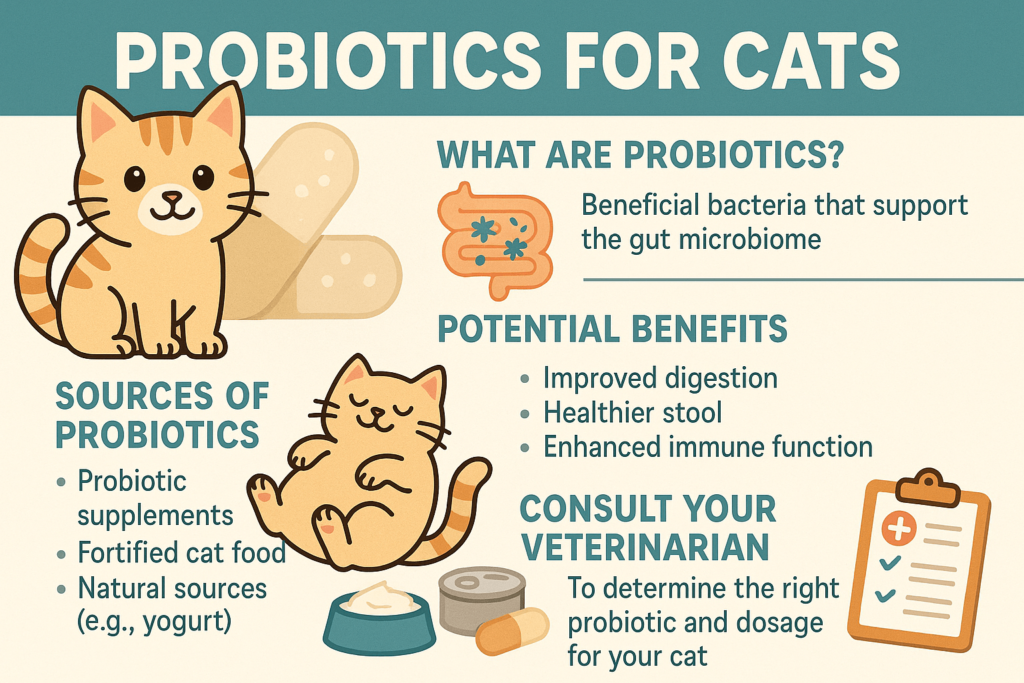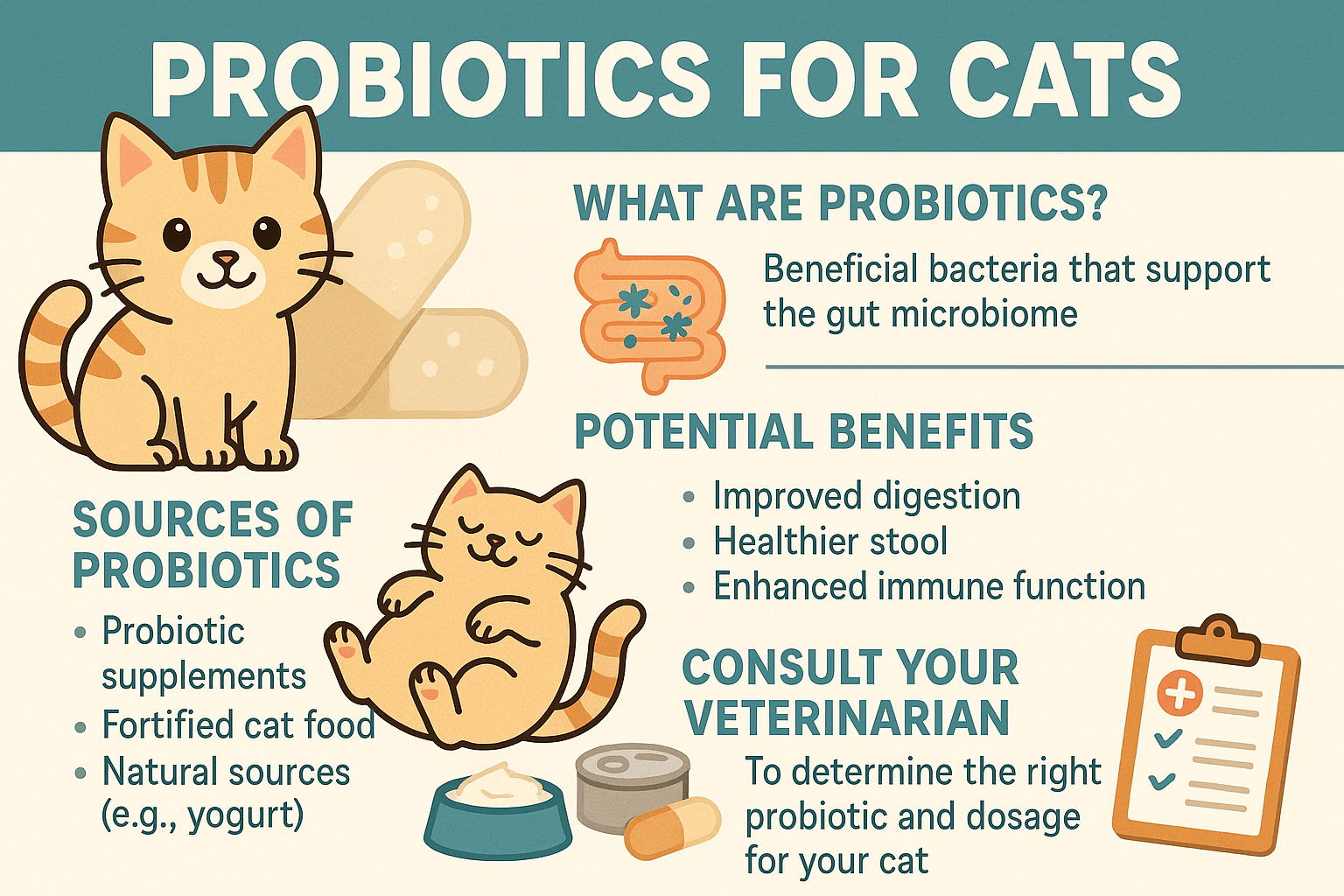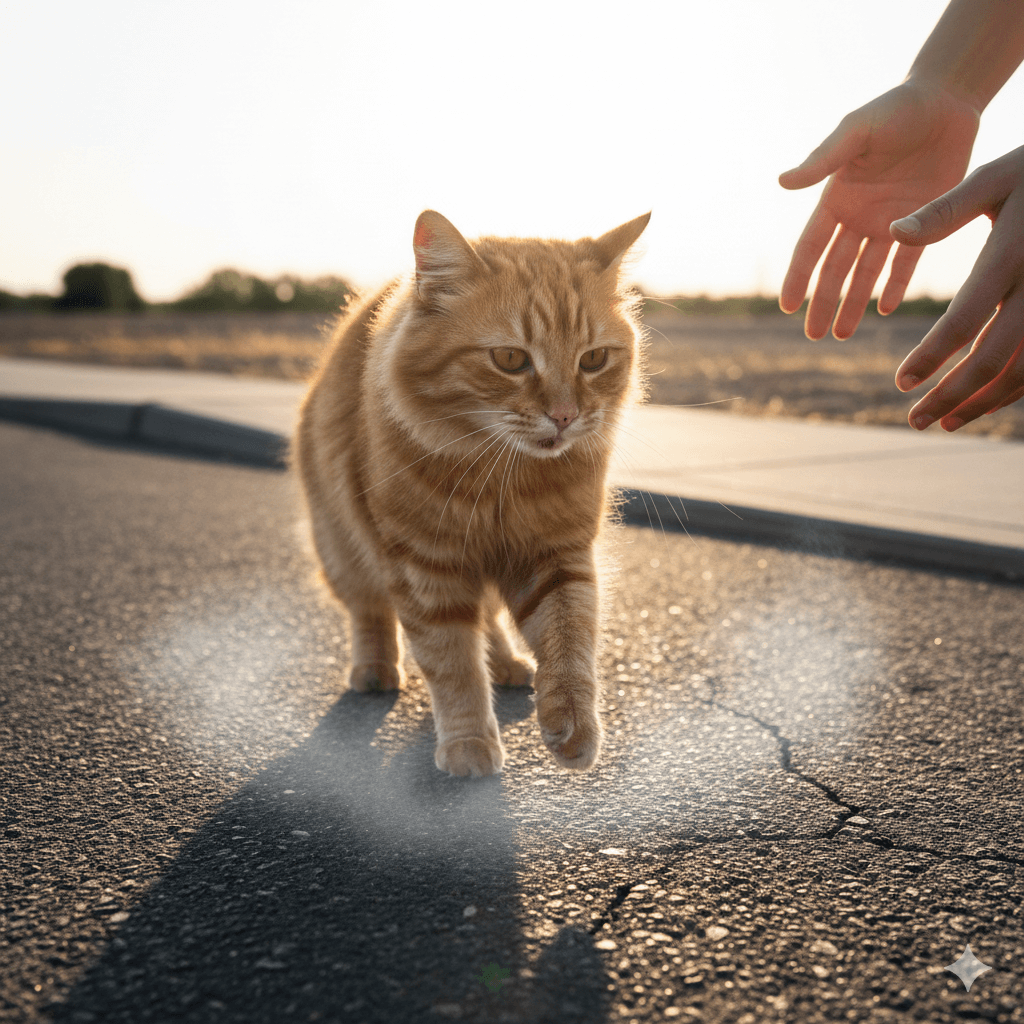Probiotics for Cats: Supporting Your Feline’s Gut Health
When it comes to your cat’s overall health, their digestive system plays a crucial role. Just like humans, cats can benefit from probiotics—live microorganisms that promote a healthy balance of gut bacteria. Whether your feline friend is dealing with digestive issues, stress, or simply needs a nutritional boost, probiotics can be a valuable addition to their diet. But what exactly are probiotics for cats, and how do they work? In this blog post, we’ll explore the benefits, uses, and considerations for incorporating probiotics into your cat’s routine, ensuring they stay happy, healthy, and thriving.
Expert Opinion on Probiotics for Cats
“Giving your cat probiotics could boost their health. Probiotics are live, beneficial microorganisms, like those found naturally in your cat’s gut. When included in their food – or given as a supplement – they add to the number of good bacteria in your cat’s gut. This improves the balance of their gut microbiome, helping them stay healthy.”
What Are Probiotics and How Do They Benefit Cats?
Probiotics are beneficial bacteria that support the digestive and immune systems by maintaining a healthy balance of gut flora. For cats, these supplements can address a variety of health concerns while promoting overall well-being.
Improved Digestion:
Probiotics help break down food more efficiently, reducing symptoms like diarrhea, constipation, or vomiting.Enhanced Immune Function:
A significant portion of a cat’s immune system resides in the gut. Probiotics strengthen this defense mechanism, helping them fight off infections.Reduced Stress-Related Issues:
Cats experiencing stress from changes in their environment may develop digestive upset. Probiotics can calm their gut during these challenging times.Support After Antibiotic Use:
Antibiotics can disrupt the natural balance of gut bacteria. Probiotics restore this balance, preventing secondary issues like diarrhea.Better Nutrient Absorption:
By improving gut health, probiotics ensure your cat absorbs essential vitamins and minerals from their food more effectively.
Incorporating probiotics into your cat’s diet can lead to noticeable improvements in their health, making them feel more comfortable and energetic.

Signs Your Cat May Need Probiotics
Not all cats require probiotics, but certain signs indicate they might benefit from these supplements. Recognizing these symptoms early can prevent more serious health problems down the line.
Frequent Diarrhea or Constipation:
Irregular bowel movements often point to an imbalance in gut bacteria that probiotics can help correct.Excessive Gas or Bloating:
Unpleasant digestive symptoms may signal the need for additional gut support through probiotics.Changes in Appetite:
A sudden loss of interest in food could indicate underlying digestive discomfort.Recurrent Skin Issues:
Allergies or skin conditions sometimes stem from poor gut health, which probiotics can address.Stressful Life Events:
Moving homes, introducing new pets, or other disruptions can upset your cat’s digestion, making probiotics a helpful remedy.
If you notice any of these signs, consulting your veterinarian about probiotics may be a wise step toward restoring your cat’s health.
Check this guide 👉Cat Epilepsy Treatment: Best 7 Health Tips!
Check this guide 👉Subscapularis in Cats: Best 7 Health Tips!
Check this guide 👉Understanding Hyperglobulinemia in Cats: Best 7 Health Tips!
Benefits of Probiotics for Cats | Common Ingredients in Cat Probiotics |
|---|---|
Improved digestion and nutrient absorption | Lactobacillus acidophilus |
Strengthened immune system | Bifidobacterium bifidum |
Relief from stress-related digestive issues | Enterococcus faecium |
Restoration of gut flora after antibiotics | Streptococcus thermophilus |
Reduced risk of chronic digestive disorders | Fructooligosaccharides (FOS) |
How to Choose the Right Probiotic for Your Cat
With so many options available, selecting the best probiotic for your cat can feel overwhelming. Here are some tips to guide you in making an informed decision.
Look for Species-Specific Strains:
Ensure the probiotic contains bacterial strains specifically formulated for cats, as human probiotics may not be effective.Check the Colony Forming Units (CFUs):
The CFU count indicates the number of live bacteria in the supplement. Aim for a product with at least 1 billion CFUs per serving.Avoid Artificial Additives:
Choose probiotics free from artificial colors, flavors, or preservatives to minimize the risk of adverse reactions.Consider the Delivery Method:
Probiotics come in various forms, including powders, chews, and capsules. Pick one that suits your cat’s preferences and your convenience.Consult Your Veterinarian:
Always seek professional advice before introducing any new supplement to ensure it’s appropriate for your cat’s unique needs.
By carefully evaluating these factors, you can find a high-quality probiotic that meets your cat’s specific requirements.
Tips for Incorporating Probiotics Into Your Cat’s Diet
Adding probiotics to your cat’s daily routine doesn’t have to be complicated. These practical tips will help you seamlessly integrate them into your feline’s lifestyle.
Start Slowly:
Introduce probiotics gradually to avoid overwhelming your cat’s digestive system. Begin with small doses and increase as tolerated.Mix with Food:
Sprinkle powdered probiotics over wet or dry food to mask the taste and encourage consumption.Use Treat-Based Probiotics:
If your cat is picky, try probiotic chews or treats designed to appeal to their palate.Follow Feeding Instructions:
Adhere to the recommended dosage on the packaging to avoid over-supplementation.Monitor for Improvements:
Keep track of changes in your cat’s digestion, energy levels, and overall behavior to gauge the effectiveness of the probiotic.
With patience and consistency, probiotics can become a seamless part of your cat’s wellness regimen.
Common Misconceptions About Probiotics for Cats
Despite their growing popularity, there are several misconceptions about probiotics for cats. Clearing up these misunderstandings ensures you make informed decisions about your pet’s health.
Probiotics Cure All Digestive Problems:
While helpful, probiotics aren’t a cure-all. Severe or persistent digestive issues require veterinary attention.All Probiotics Work the Same Way:
Different strains target specific health concerns, so not all probiotics deliver the same benefits.Probiotics Are Only for Sick Cats:
Even healthy cats can benefit from probiotics as a preventive measure to maintain optimal gut health.Higher CFUs Always Mean Better Results:
More isn’t always better. The right CFU count depends on your cat’s individual needs and tolerance.Probiotics Replace a Balanced Diet:
Supplements should complement—not replace—a nutritious diet tailored to your cat’s age, breed, and activity level.
Understanding these facts helps dispel myths and ensures proper use of probiotics for your cat.
Signs Your Cat Is Responding Well to Probiotics
Once you’ve started giving your cat probiotics, look for these positive signs to confirm they’re working effectively.
Improved Stool Consistency:
Firmer stools and regular bowel movements indicate a healthier digestive tract.Increased Energy Levels:
A more active and playful demeanor suggests improved nutrient absorption and vitality.Shinier Coat and Healthier Skin:
Enhanced gut health often reflects in your cat’s coat quality and reduced skin irritation.Decreased Gastrointestinal Upset:
Fewer episodes of vomiting, diarrhea, or gas signal a balanced gut microbiome.Better Appetite and Weight Maintenance:
A stable appetite and healthy weight are good indicators of improved overall health.
These signs confirm that probiotics are positively impacting your cat’s well-being.
Alternatives to Probiotic Supplements
If traditional probiotic supplements aren’t suitable for your cat, there are alternative ways to support their gut health naturally.
Fermented Foods:
Small amounts of plain yogurt or kefir (without added sugars) can provide natural probiotics.High-Fiber Diets:
Fiber-rich foods like pumpkin or specialized cat foods promote healthy digestion and feed beneficial gut bacteria.Bone Broth:
Rich in nutrients, bone broth supports gut lining repair and overall digestive health.Hydration:
Ensuring your cat drinks enough water helps maintain proper digestion and prevents constipation.Environmental Enrichment:
Reducing stress through play, companionship, and a stable environment indirectly supports gut health.
These alternatives offer creative solutions for supporting your cat’s digestive system without relying solely on supplements.
Frequently Asked Questions About Probiotics for Cats
Are probiotics safe for cats?
Yes, when used appropriately, probiotics are generally safe and beneficial for most cats. However, consult your vet before starting any new supplement.
Can kittens take probiotics?
Yes, kittens can benefit from probiotics, especially if they experience digestive issues. Always choose kitten-safe formulations.
How long does it take to see results?
Some cats show improvement within days, while others may take several weeks. Consistency is key to seeing positive effects.
Do probiotics interact with medications?
While rare, interactions can occur. Speak to your veterinarian if your cat is on medication to ensure safety.
Can I give my cat human probiotics?
It’s best to avoid human probiotics, as they may not contain the right strains or dosages for cats. Opt for species-specific formulas instead.
Investing in Your Cat’s Gut Health with Probiotics
Probiotics offer a simple yet powerful way to support your cat’s digestive and immune health, enhancing their quality of life in countless ways. From improving digestion to boosting immunity and alleviating stress-related issues, these supplements can make a meaningful difference in your feline companion’s well-being. By understanding the benefits, recognizing the signs, and choosing the right product, you can confidently incorporate probiotics into your cat’s routine. Remember, a healthy gut means a happy cat—and that’s something every pet parent strives for.
Newfoundland Dog Personality: Best 7 Expert Tips! – Discover the gentle, loyal, and protective nature of this giant breed perfect for families.
Can Hot Pavement Burn Your Cats Paws? Best 7 Expert Tips! – Learn how to protect your cat’s paws from hot surfaces and prevent painful burns this summer.
Can Hot Pavement Burn Your Dogs Paws? Best 7 Expert Tips! – Learn how to protect your dog’s paws from hot surfaces and ensure safe summer walks.
Irish Wolfhound Size: Best 7 Expert Tips! – Discover the ideal height, weight, and care tips for this majestic giant breed. Learn how to manage their impressive stature responsibly.





